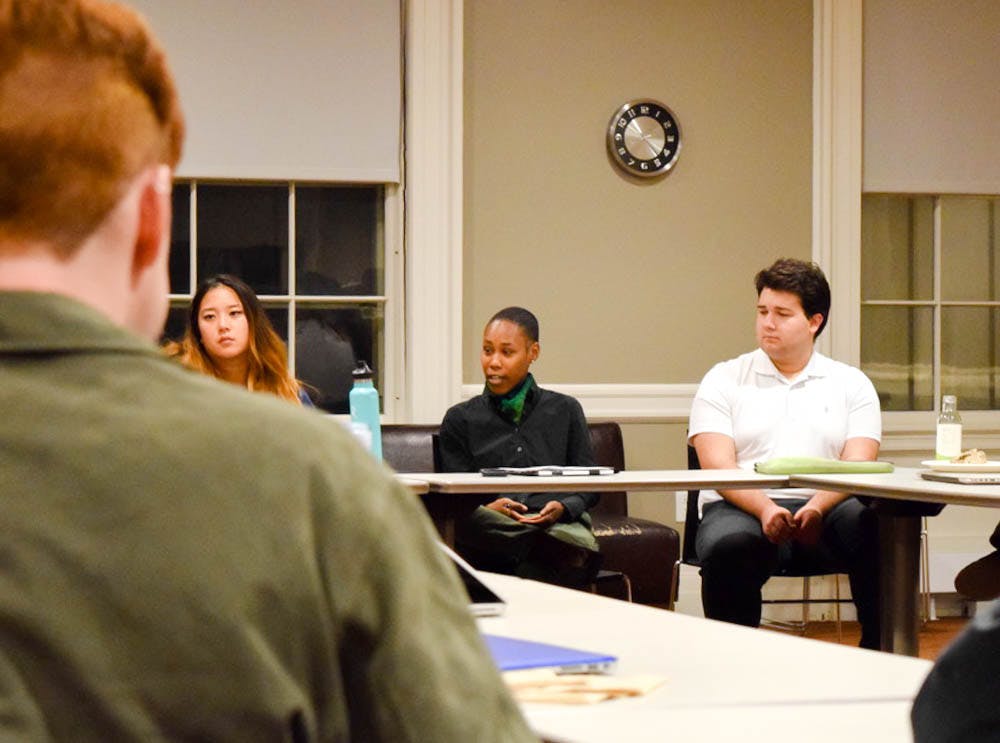During its weekly general body meeting Wednesday evening, the Undergraduate Council of Students heard updates on the development of a new bias incident reporting system, to be implemented next semester.
Shay Collins, director of institutional equity and community engagement at the Office of Institutional Equity and Diversity, explained the purpose of the new system, outlined some of its key elements and took questions from UCS members. Last year, UCS discussed and recommended improvements for bias-related incident reporting at multiple general body meetings, The Herald previously reported.
If incidents involve actions “motivated by bias against a victim’s race, religion, ethnicity, sexual orientation, gender or disability,” they may be classified as “hate/bias incidents” but not as criminal acts, according to the Department of Public Safety.
Under the new system, individuals will be able to submit bias incident reports to be reviewed by a team chaired by Collins. Following the team’s review, Collins will offer to meet individually with the complainant to ask how they would like to proceed with the report, they said. When filing a report, individuals can express their desired outcomes. “Sometimes people will just say, ‘I just want you to document it, I just want you to know,’” Collins said. Though “people can choose that they don’t want an investigation … there will be certain cases where that’s not an option,” they added.
In addition, bias reports can be submitted anonymously under certain circumstances, Collins said.
The review team will also consult with DPS in some cases, like with incidents involving property defacement, Collins said.
“I know that that can be challenging for some people,” Collins said. “DPS has the cameras, and they have the ability to investigate. … So we need DPS to be able to properly investigate (some of) these incidences.”
The team reviewing bias incident reports will include one staff member, one undergraduate student, one representative from the medical school and one graduate student, Collins said.
The assistant vice president for institutional equity and diversity and a representative from University Human Resources will serve as ex officio team members. In addition, H.R. will attend meetings involving staff issues, and all team members will undergo confidentiality training, Collins added.
The OIED aims to have one undergraduate representative attend every meeting for the bias incident review team, Collins said. They requested that three undergraduates serve in the representative role “because of scheduling.”
Collins said they are hoping to launch the application for the role next week after receiving approval from Vice President for Institutional Equity and Diversity Shontay Delalue.
When Shivani Nishar ’20, the chair of student wellness, asked Collins about “circumstances where you would send a person who is reported to a different place on campus,” Collins said they reserved “the right to consult with offices on an as-needed basis,” including the Division of Campus Life and Student and Employee Accessibility Services. In such instances, however, names would be redacted from reports, Collins added.
Additionally, Collins said they are required by law to send any Title IX-related issues to the Title IX Office.
Alongside the reporting system, there will be a “glossary of terms” available online, which will define terms like “bias” and “bias incident,” Collins said.
The OIED will also hold information sessions before the end of the semester so that “the campus community is aware that this system is coming out,” Collins said. The meetings will take place in late November, early December and late January, they added.
The OIED will also organize “a series of trainings and workshops” for members of the Brown community to answer key questions like what constitutes a bias incident and which individuals are most affected by bias, Collins said. There will be 11 trainings, with the first six being offered next semester.
UCS Vice President Camila Pelsinger ’20 asked about “ideas for (getting) word out about this new reporting system” and how UCS could support those efforts.
Collins said that though the new system is not yet live, UCS can tell students “that they can report (bias incidents) now.”
The OIED will also begin publishing reports “about the incidents that happen on campus,” Collins said. “We’ll aggregate the data and give you some averages on what’s happening and where it’s happening,” as well as information on affected communities and potential responses.
“We’re hoping that this system will be a record-keeping system that allows us to document these incidences of bias and then create some educational community-based responses,” they said.
Collins acknowledged that “a lot of the work was done by UCS early (on) to advocate for the system.”
Last fall, a team of students from both inside and outside the Council as well as former UCS President Chelse-Amoy Steele ’18 worked with offices such as the OIED to develop the new system, according to an email Steele sent to the general body early this summer.





